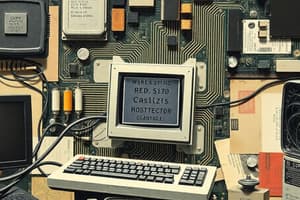Podcast
Questions and Answers
The Power Supply is responsible for cooling the computer.
The Power Supply is responsible for cooling the computer.
False (B)
The ALU performs control functions in the CPU.
The ALU performs control functions in the CPU.
False (B)
Registers are a type of permanent storage.
Registers are a type of permanent storage.
False (B)
The CPU executes instructions and performs calculations.
The CPU executes instructions and performs calculations.
A Solid-State Drive (SSD) uses spinning disks and magnetic heads for storage.
A Solid-State Drive (SSD) uses spinning disks and magnetic heads for storage.
Flashcards are hidden until you start studying
Study Notes
Main Parts of a Computer
Hardware Components
- Central Processing Unit (CPU): executes instructions and performs calculations
- Memory (RAM): temporary storage for data and applications
- Storage Drive: permanent storage for data, programs, and operating system
- Input/Output (I/O) Devices: keyboard, mouse, monitor, and other devices for user interaction
- Power Supply: provides power to all components
Functional Units of a CPU
- Arithmetic Logic Unit (ALU): performs arithmetic and logical operations
- Control Unit: retrieves and executes instructions
- Registers: small amount of on-chip memory for fast data access
Types of Storage
- Hard Disk Drive (HDD): traditional storage device using spinning disks and magnetic heads
- Solid-State Drive (SSD): faster storage device using flash memory
- Removable Storage: devices such as USB drives and CDs/DVDs for portable data storage
Main Parts of a Computer
- A computer consists of several hardware components that work together to perform tasks.
- These components include the Central Processing Unit (CPU), Memory (RAM), Storage Drive, Input/Output (I/O) Devices, and Power Supply.
Central Processing Unit (CPU)
- The CPU executes instructions and performs calculations.
- It is responsible for controlling the other components of the computer.
Memory (RAM)
- Memory (RAM) provides temporary storage for data and applications.
- Data is lost when the computer is turned off.
Storage Drive
- The Storage Drive provides permanent storage for data, programs, and the operating system.
- Data is retained even when the computer is turned off.
Input/Output (I/O) Devices
- Input/Output (I/O) Devices allow users to interact with the computer.
- Examples of I/O Devices include the keyboard, mouse, and monitor.
Power Supply
- The Power Supply provides power to all components of the computer.
- It is essential for the proper functioning of the computer.
Functional Units of a CPU
Arithmetic Logic Unit (ALU)
- The Arithmetic Logic Unit (ALU) performs arithmetic and logical operations.
- It is responsible for performing calculations and comparisons.
Control Unit
- The Control Unit retrieves and executes instructions.
- It acts as the "brain" of the CPU, controlling its operations.
Registers
- Registers are small amounts of on-chip memory for fast data access.
- They are used to store data temporarily while it is being processed.
Types of Storage
Hard Disk Drive (HDD)
- A Hard Disk Drive (HDD) is a traditional storage device using spinning disks and magnetic heads.
- It is a non-volatile storage device, meaning data is retained even when the computer is turned off.
Solid-State Drive (SSD)
- A Solid-State Drive (SSD) is a faster storage device using flash memory.
- It is also a non-volatile storage device, with data retained even when the computer is turned off.
Removable Storage
- Removable Storage devices allow users to store and transport data between computers.
- Examples of Removable Storage devices include USB drives and CDs/DVDs.
Studying That Suits You
Use AI to generate personalized quizzes and flashcards to suit your learning preferences.




